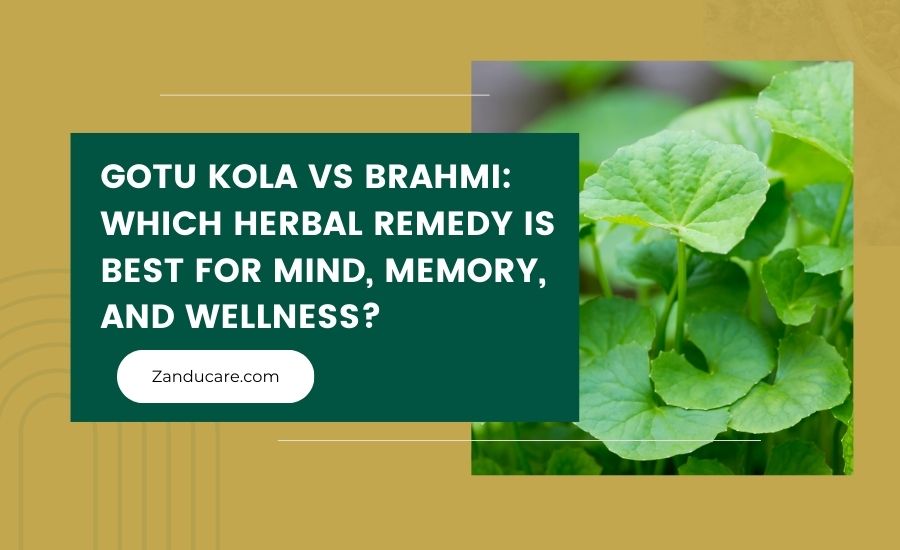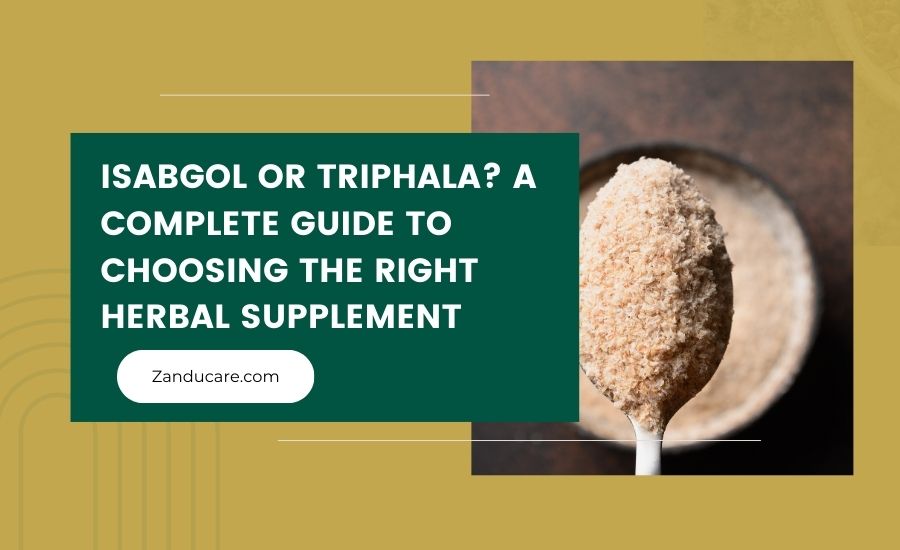
Gotu Kola vs Brahmi: Key Differences in Benefits & Uses
|
Key insights:
|
In recent years, herbal remedies have gained significant attention, particularly as people search for natural ways to boost cognitive health and overall wellness. Among the many herbs celebrated in Ayurveda, Gotu Kola and Brahmi stand out for their potential to support mental clarity, memory, and stress relief. But which herb is the best fit for your wellness goals? This article dives into the unique qualities, benefits, and uses of Gotu Kola and Brahmi to help you make an informed decision.
|
Did You Know?
|
Difference Between Brahmi and Gotu Kola
|
Aspect |
Brahmi |
Gotu Kola |
|
Botanical Name |
Bacopa monnieri |
Centella Asiatica |
|
Traditional Use |
Used mainly in Ayurveda to improve memory and reduce anxiety |
Widely used in Ayurvedic and Chinese medicine for boosting brain health and improving circulation |
|
Primary Benefits |
It enhances memory, reduces anxiety, and calms the mind |
Improves mental clarity, supports circulation, and helps with wound healing |
|
Key Active Compounds |
Bacosides, which support brain health and reduce oxidative stress |
Triterpenoids, known for their anti-inflammatory and wound-healing properties |
|
Impact on Brain |
Known for improving memory and learning capacity by aiding neuron health |
Promotes mental clarity and focus by improving blood flow to the brain |
|
Effects on Stress |
Calms the nervous system and lowers stress hormone levels |
Acts as a mild adaptogen, helping to balance mood and reduce fatigue |
|
Physical Benefits |
Supports liver health, offers antioxidant benefits |
It benefits skin health, aids wound healing, and improves circulation |
|
Forms Available |
Powder, capsules, oil (for topical use) |
Powder, capsules, extracts, and creams |
|
Common Side Effects |
Mild stomach upset, potential headaches |
Drowsiness at high doses may cause dizziness |
|
Best For |
Those looking to improve memory, learning, and reduce stress |
Those seeking better mental clarity, focus, and skin health |
What is Gotu Kola?

Gotu Kola is an herb related to parsley that has long been used in traditional Indian (Ayurvedic) and Chinese medicine. People have been using it since ancient times in India, China, and Southeast Asia.
In Ayurvedic medicine, Gotu Kola is sometimes called the "longevity herb." This is because it is thought to support health and well-being. Gotu Kola is also considered a rejuvenating herb, which means it is thought to renew the body. Many believe Gotu Kola can improve memory, help people think clearly, and support brain function. It is respected for its use in the mind and cognition.
What is Brahmi?

The name "Brahmi" comes from the Sanskrit word "Brahman." In Hindu philosophy, Brahman refers to the supreme consciousness or ultimate reality. Brahmi herbs are thought to awaken the mind, expand awareness, and improve brain function.
In Ayurvedic medicine, Brahmi is a term for herbs supporting mental health and stress adaptation. Two herbs used in Ayurveda for this purpose are Gotu Kola and Bacopa. Gotu Kola and Bacopa have long histories in Ayurveda for promoting memory, clarity, and well-being. In different regions of India, both were called "Brahmi" due to their benefits for the mind.
Benefits of Using Brahmi
Here are the advantages of using Brahmi:
1. May Reduce Inflammation

Inflammation is your body's natural healing response, but chronic inflammation contributes to diseases like diabetes and cancer. Studies indicate the herb Bacopa monnieri may reduce harmful inflammation. In lab research, Bacopa suppressed inflammatory immune molecules and enzymes that drive pain and swelling.
Animal studies also found that Bacopa has anti-inflammatory effects similar to those of common anti-inflammatory medications like diclofenac. This suggests that Bacopa may act as a natural anti-inflammatory. However, human studies are still needed to confirm if Bacopa reduces inflammation in people.
So far, it shows promise in test tubes and animal models, but more research is required to verify if these results apply to humans.
2. Improves Brain Function
Brahmi, a brain tonic, can benefit people of all ages and genders. Daily supplementation is strongly associated with improved brain function, and research continues to demonstrate its scientific value. Brahmi is thought to enhance children's spatial learning and memory retention.
It has been shown to enhance the visual processing of information, learning rate, and memory in adult groups. It also enhances the attention and memory of elderly adults. Therefore, taking a Brahmi supplement can improve memory, focus, and information processing overall.
3. Brahmi Benefits for Hair

Because the herb nourishes hair follicles and promotes healthy hair development, Brahmi's benefits for hair have received a lot of attention in hair care. Additionally, Brahmi contains antioxidant properties that prevent environmental stressors and free radicals from damaging hair.
Regular use of Brahmi oil or other Brahmi-containing hair treatments will help prevent premature greying, reduce hair loss, and enhance the overall condition of your hair.
4. May Help Reduce ADHD Symptoms
Attention deficit hyperactivity disorder (ADHD) is a brain disorder that makes it hard to pay attention and control impulsive behaviour. An herb called Bacopa monnieri may help reduce ADHD symptoms.
One study gave 31 children ages 6-12 with ADHD a daily 225 mg Bacopa supplement for 6 months. After treatment, 85% of the children had significantly fewer ADHD symptoms like restlessness, poor focus, being easily distracted, and acting impulsively.
Another study of 112 boys ages 6-14 found Bacopa improved thinking skills, mood, and sleep in those with ADHD. But it did not affect their hyperactive behaviours.
While these initial findings seem promising for Bacopa as an ADHD remedy, more large studies are needed before it can be recommended. The current research is still limited in scale and scope.
5. May Help Lower Blood Pressure Levels
High blood pressure strains the heart and blood vessels, increasing the risk of heart disease. The herb Bacopa monnieri may help keep blood pressure in a healthy range. One animal study found Bacopa lowered systolic and diastolic blood pressure levels by releasing nitric oxide, which relaxes blood vessels, improving blood flow. A 2020 human study also found a supplement with Bacopa lowered blood pressure.
However, another study in healthy adults showed no blood pressure benefit from Bacopa. So far, Bacopa seems to reduce blood pressure in animals with hypertension, but current human research is mixed. More studies are needed to confirm if Bacopa lowers blood pressure in people.
Do check our Brahmi Products:
Benefits of Gotu Kola
Below are the advantages of Gotu Kola:
1. It may Help Reduce Anxiety and Stress

A 2016 animal study found the herb gotu kola may reduce anxiety caused by sleep deprivation. Mice were severely sleep-deprived for 3 days, causing anxiety, oxidative damage, and inflammation in the brain. However, mice who were given gotu kola before sleep deprivation showed less anxious behaviours, improved activity levels, and less oxidative damage.
A 2013 review also concluded that gotu kola has an anti-anxiety effect. However, more studies in humans are needed to confirm this. To use gotu kola for anxiety, take 500 mg twice daily for up to 14 days. In severe anxiety, up to 2,000 mg per day can be taken safely. However, its anti-anxiety effects still require more research on people.
2. Wound Healing and Skin Lesions
Triterpenoids are compounds found in gotu kola. In laboratory and animal experiments, these substances appear to aid in wound healing. Certain research suggests that triterpenoids may improve wound antioxidants, strengthen the skin, and improve blood flow to the area. In light of these discoveries, gotu kola has been used topically to treat psoriasis, minor burns, surgical scar prevention, and stretch mark reduction.
Gotu kola is a common ingredient in wound-healing lotions. Ask your healthcare professional to find out if one is right for you.
3. Improving Cognitive Function
Older reviews show that gotu kola may support brain function, memory, and healthy ageing. However, newer research does not support all these claims. A 2017 study found that gotu kola improved alertness and reduced anger but did not substantiate other cognitive benefits. Another 2016 study looked at people with stroke-related thinking problems. It found that gotu kola barely improved outcomes compared to folic acid.
However, some participants did see slightly better long-term memory from the herb. So, while early evidence was promising for gotu kola and brain health, later studies don't confirm all the initial findings. There's limited recent proof for memory or broader brain benefits. But gotu kola may help with factors like alertness and anger control. More research is still needed.
4. It may act as an Antidepressant
Gotu kola may also act as an antidepressant by positively affecting the brain. A 2016 review cited a study where people with anxiety disorder took gotu kola instead of antidepressants for 60 days. Participants self-reported decreased stress, anxiety, and depression.
Another study in the review looked at chronically depressed rats. Gotu kola positively impacted behavioural signs of depression, including body weight, temperature, and heart rate. This early evidence suggests that gotu kola may have antidepressant qualities. To use it, take 500 mg twice daily for up to 14 days or up to 2,000 mg per day for more severe depression. However, larger-scale human research is still needed to confirm that gotu kola effectively treats symptoms of depression.
5. Relieving Anxiety
There is very limited evidence that the herb gotu kola may reduce anxiety. One older, small study of 40 people found gotu kola improved the startle response - when someone suddenly reacts to a surprise stimulus. This is relevant because people with anxiety tend to startle more easily. However, this one study provides insufficient proof that gotu kola alleviates anxiety.
As of now, minimal evidence and research support the use of gotu kola as an anti-anxiety treatment. More work is required to demonstrate its effectiveness for anxiety.
Side-Effects of Gotu Kola and Brahmi
Below are the side-effects of both these herbs:
Gotu Kola
- Generally well-tolerated, it can cause headaches, upset stomach, and dizziness.
- Take a low dose first, then gradually increase to reduce side effects.
- Only take 2-6 weeks, then take a 2-week break before resuming.
- Topical use can irritate the skin; always patch test first.
- Contamination with heavy metals is possible since it is not FDA-monitored.
- Avoid if pregnant, breastfeeding, have liver disease, or recent surgery.
- Also, avoid if you are under 18 or have a skin cancer history.
- Discuss with a doctor first if you have liver/kidney disease, diabetes, high cholesterol, take sedatives, anxiety medications, or diuretics.
Brahmi
- Considered safe, but it can cause nausea, stomach cramps, and diarrhoea.
- It is not recommended for pregnant or breastfeeding women; no safety studies exist.
- It may interact with certain medications like the antidepressant amitriptyline.
- Talk to your doctor before taking any medications.
- The risk of side effects is lower if taken with food.
- Start with a small dose and slowly increase over several weeks.
- Take a break of a week every few months to give the body a rest.
- Avoid taking it at night as it may disturb sleep.
- Stop use if you experience fatigue, gastrointestinal issues, or a fast heartbeat.
How to Incorporate Gotu Kola and Brahmi in Daily Routine
Here are some of the ways by which you can incorporate both these herbs in your daily routine:
1. Supplements and Capsules
Both herbs are available in capsule form, making incorporating them into your daily wellness routine easy. Look for high-quality, organic options to ensure purity and efficacy.
2. Herbal Teas and Infusions
Preparing Gotu Kola or Brahmi tea is a popular way to enjoy its benefits. Steep 1-2 teaspoons of the dried herb in hot water for 10-15 minutes. Brahmi tea can be enjoyed with honey to balance its slightly bitter taste, while Gotu Kola tea is mild and refreshing.
3. Topical Applications
Gotu Kola is commonly found in skincare products, especially in creams designed to heal scars or promote firm skin. Brahmi oil is often applied to the scalp to relieve stress and promote hair health. Massage a few drops into the scalp before bed for a calming night routine.
Do have a look at our other Brahmi comparison guide:
Conclusion
In the debate of Gotu Kola vs Brahmi, both herbs offer impressive benefits for the mind, memory, and wellness. Gotu Kola may be better suited for enhancing focus, supporting skin health, and boosting circulation. With its strong effects on memory and stress relief, Brahmi is ideal for those facing cognitive challenges and emotional stress. Ultimately, the choice depends on individual needs and wellness goals.
To experience the best results, consider integrating these herbs consistently into your routine, and always consult a healthcare provider for personalised advice. With regular use, both Gotu Kola and Brahmi can be powerful allies in your journey towards a balanced, healthier life.
FAQs
1. What is the main difference between Gotu Kola and Brahmi?
The main difference is that Gotu Kola (Centella Asiatica) is used more to boost brain health and circulation, while Brahmi (Bacopa monnieri) is used more to enhance memory and reduce stress and anxiety.
2. Which herb is best for improving skin health?
Gotu Kola is best for skin health. It contains compounds called triterpenoids that aid wound healing. Gotu Kola is commonly used topically for burns, scars, stretch marks and skin lesions.
3. Can Brahmi help treat ADHD symptoms?
Some initial research shows Brahmi may help reduce hyperactivity, impulsivity and inattention in children with ADHD. However, more large-scale studies are still needed before Brahmi can be recommended specifically for ADHD.
4. How can you take Gotu Kola - as a supplement or tea?
Gotu Kola is available as supplements, capsules, and herbal tea. The tea can be made by steeping 1-2 teaspoons of dried Gotu Kola in hot water for 10-15 minutes.
5. What are the potential side effects of Brahmi?
Brahmi may cause side effects like nausea, stomach cramps, diarrhoea, fatigue, and a fast heartbeat in some people. It is not recommended for pregnant women. Brahmi can also interact with medications like antidepressants.
6. Can Gotu Kola be applied to the skin?
Yes, Gotu Kola creams and ointments are commonly used topically to treat skin conditions and wounds. Always do a patch test before full application to check for irritation.
References:
- Studies indicate the herb Bacopa monnieri may reduce harmful inflammation.(https://pmc.ncbi.nlm.nih.gov)
- It also enhances the attention and memory of elderly adults. Therefore, taking a Brahmi supplement can improve memory, focus, and information processing overall.(https://pubmed.ncbi.nlm.nih.gov)
- The herb Bacopa monnieri may help keep blood pressure in a healthy range. (https://pubmed.ncbi.nlm.nih.gov)
- A 2016 animal study found the herb gotu kola may reduce anxiety caused by sleep deprivation.(https://pubmed.ncbi.nlm.nih.gov)





